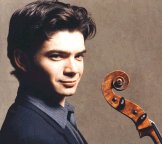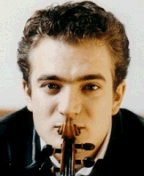When I
heard the Capuçon brothers at Shriver Hall this past January, they were playing a program partially drawn from their 2003 recording
Face à Face, featuring five pieces for the relatively rare combination of unaccompanied violin and cello. Violinist Renaud and cellist Gautier, the younger brother, have made quite a splash in recent years in France (and elsewhere), for example,
playing Beethoven's Triple Concerto with Martha Argerich last summer at the Roque d'Anthéron piano festival. A copy of their duo CD recently came across my desk, and it has been a delight for my ears.
At the literal center of this disc is a striking new work by
Eric Tanguy (b. Caen, 1968), who is sometimes cited as the most compelling young French composer of our day. The
Sonata for Violin and Cello was composed for the Capuçons in 2002, premiered by them in that year, and then given its first recording here. The first movement (Animé) launches like a wildcat from the opening explosion of fierce pizzicati and never looks back. As technically impressive as both Capuçons are, their strength is lyrical playing, and this exquisite slow movement (Dolce) is a melancholy two-voiced elegy. Eric Tanguy is working on two operas,
Chronos (slated for a premiere at the Théâtre de Caen in 2002, which apparently never happened) and
Le libertin foudroyé (composed for radio at the request of Radio France). He collaborates with librettist Michel Onfray. I'll be looking for more information about Tanguy's operas.
Two of the best pieces that the Capuçons played at Shriver Hall are highlights on the recording, too. Zoltán Kodály's
Duo for Violin and Cello, op. 7, and Erwin Schulhoff's
Duo for Violin and Cello are placed on either side of the Tanguy sonata. Both composers are Eastern European -- Hungarian and Czech -- and there are folk and gypsy sounds in both duos. Renaud and Gautier Capuçon are at their best in these three pieces, seemingly happiest when confronted with thornier music and a fuller palate of harmonic color. I recall that the live performance of Johan Halversen's
Passacaille after Handel, as an encore at Shriver Hall, was more exciting than this recorded version (track 1), where some of the most difficult passages did not have the same deadly accuracy. The last piece,
Variations brillantes sur God Save the King, op. 38, is a collaborative composition by two virtuosi, violinist Joseph Ghys and cellist Adrien François Servais. It has the least musical interest, although it is by no means an empty showpiece, and the performance is the least pleasing on this fine disc.
The Capuçon brothers will come back to the Kennedy Center this season, after a
chamber performance there in 2004. On
February 15 to 17, they will perform Brahms's concerto for violin and cello with the National Symphony, on a program with
Harmonielehre by John Adams, in honor of that composer's 60th birthday.
Virgin 7243 545586 2 7






















































No comments:
Post a Comment